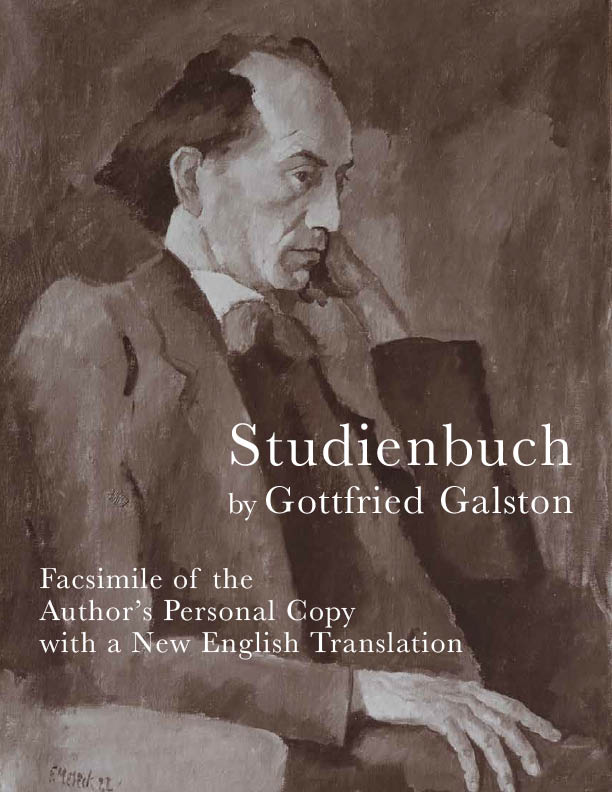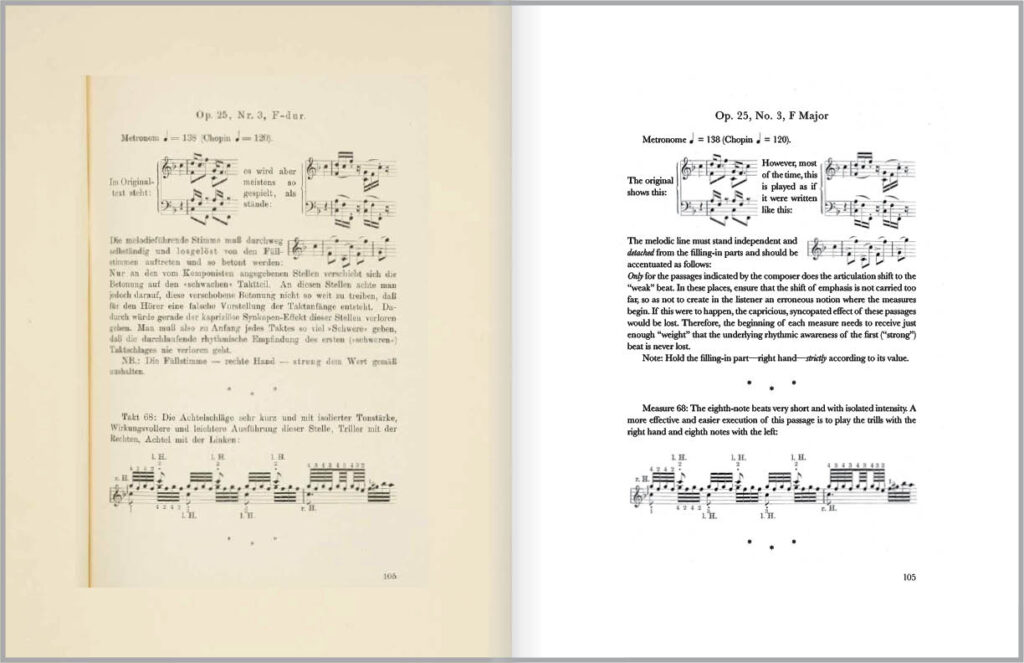The University of Tennessee Libraries announces the first known English translation of a pioneering study in piano pedagogy. Gottfried Galston’s Studienbuch records the thought processes and musical interpretations of a preeminent concert pianist as he perfected the repertoire for his 1907 concert tour. Galston’s Studienbuch — in both the original German and a new English translation — is now freely available online in two formats, as a digital exhibition and as a downloadable PDF.
In 1907, renowned pianist Gottfried Galston (1897–1950) began his famous Cycles concerts, a series of five recitals devoted to the great masters Beethoven, Chopin, Liszt, Bach, and Brahms. Galston presented the concerts to great acclaim in London, Paris, Amsterdam, Berlin, and Vienna. Following his celebrated European tour, Galston penned his Studienbuch, a “study book” that articulates his interpretations of the Cycles repertoire.
The Studienbuch was first issued in 1910 by the Berlin publishing house of Bruno Cassirer. A unique bound copy of that edition now resides in UT’s Betsey B. Creekmore Special Collections and University Archives. That singular specimen includes printed pages of the 1910 Studienbuch interleaved with oversized sheets and three quarter bound with marble boards. The interleaved sheets provided space for Galston to make editorial changes that were later incorporated into a second edition of the Studienbuch.
Galston’s hand-corrected copy of the Studienbuch is part of the UT Libraries’ extensive collection of materials relating to Galston and his mentor, the renowned pianist, composer, and conductor Ferrucio Busoni (1866–1924). The Gottfried Galston Music Collection and the Galston-Busoni Archive were gifts to the UT Libraries from Helen Galston Tibbe, Gottfried Galston’s widow. The UT Libraries first came to the attention of Mrs. Tibbe through a personal connection with William and Patricia Carter — former students of Gottfried Galston and members of the University of Tennessee music faculty at the time of the donation in 1974.
Patricia Carter was also the motivating force behind the UT Libraries’ project to digitize and publish the Studienbuch. It was she who some years ago commissioned the English translation published by the University of Tennessee Libraries.
The digital exhibition of the Studienbuch, available at exhibits.lib.utk.edu/galston, features a digital surrogate of the unique bound volume held by the Betsey B. Creekmore Special Collections and University Archives. As viewers flip through the original German-language pages, they can also access the English translation for each page. The exhibit also features a “tour” of the bound volume, which highlights its unique elements such as handwritten notes from pianists Leopold Godowsky and Ferruccio Busoni and translations of Galston’s handwritten notes, as well as information about the binding and the publication itself. Other sections of the exhibit include an illustrated timeline of Galston’s life and career, and printed programs from a series of recitals Galston performed between 1919 and 1921.
A downloadable and printable dual-language version of the Studienbuch (in PDF format) is freely available from Newfound Press (newfoundpress.utk.edu), an online imprint of the UT Libraries. The Studienbuch by Gottfried Galston: Facsimile of the Author’s Personal Copy with a New English Translation includes a facsimile of each page from the 1910 German-language edition, side-by-side with the English translation, as well as a transcription (in English) of the programs and notes for Galston’s Cycles concerts.
Galston intended for his study book to both instruct and inspire. As he wrote in the foreword to the Studienbuch: “For a long time I have been wondering why no virtuoso has decided to record, in a separate and independent form, the varied ideas and experiences that inevitably come to his mind while studying and performing his repertory pieces. While studying a work, every thoughtful artist experiences a whole world of emotions, forms perceptions and makes decisions, finds and defines the points of attack, discovers hidden pivotal points around which the entire work turns, secretly identifies the treacherous spots in order to be armed against them, and much more.… There may be great value in what is said about the works of a composer, or in what is inspired, felt, and expressed by these works. These experiences and perceptions ought to be recorded in ‘study books.’”
Music critic Leonard Liebling declared Galston to be “not only a deep thinker but also a born teacher.” In a 1912 review in The Musical Courier, Liebling proclaimed that Galston “branches out into a new field of musico-literary endeavor, and gives a detailed record of his interpretations, with the reasons for the things he does, and the experiences and impressions undergone at the piano during his preparation of the five tremendous programs … [T]hese ‘confessions’ of Galston are to me the most interesting notes ever published on the art of piano playing.”
The University of Tennessee Libraries invites you to follow Gottfried Galston’s interpretative journey in this first-ever English translation of the Studienbuch.

